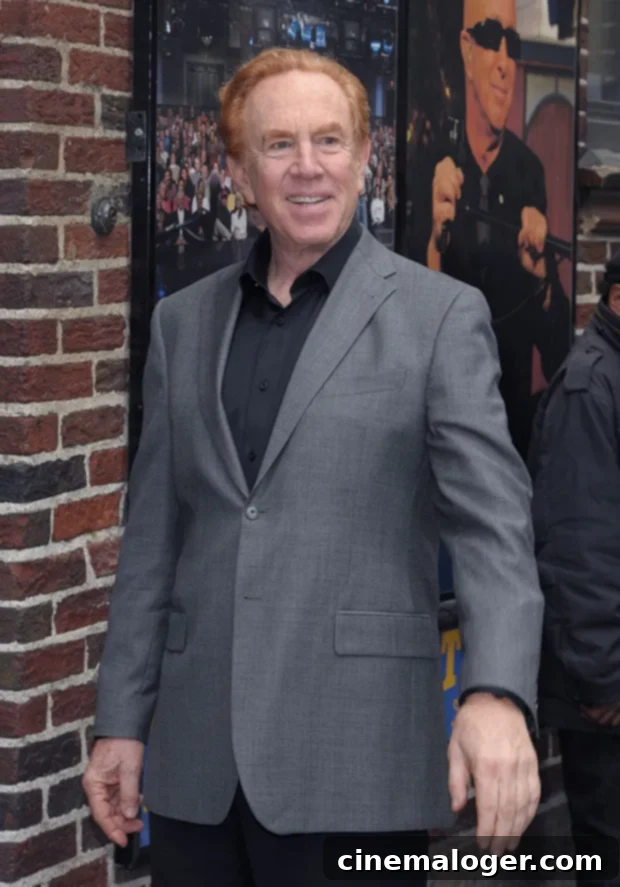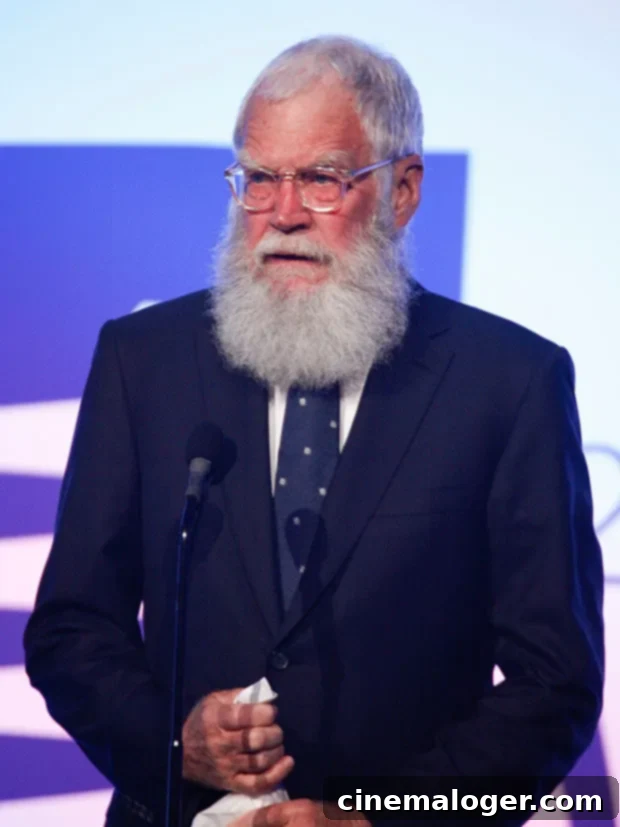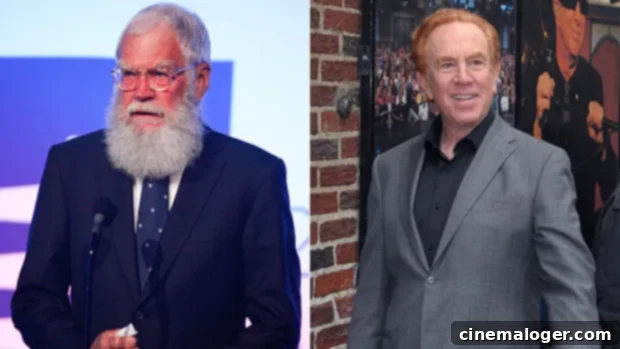Remembering Alan Kalter: David Letterman’s Iconic Late Show Announcer and Comic Legend Passes Away at 78
The world of late-night television, and indeed the entire broadcasting community, is mourning the loss of a truly unique and beloved voice: Alan Kalter. For two decades, Kalter was far more than just an announcer for The Late Show with David Letterman; he was an indelible part of the show’s comedic fabric, a brilliant foil, and a familiar, comforting presence to millions of viewers. News broke recently of his passing at the age of 78, an announcement that immediately prompted an outpouring of tributes and fond recollections from fans and colleagues alike. His wife, Peggy Kalter, confirmed his death at Stamford Hospital in Connecticut, though the family chose not to disclose the specific cause. Kalter’s departure marks the end of an era for those who grew up with his distinctive voice and memorable on-screen antics.
His tenure on The Late Show, which began in 1995 and concluded with David Letterman’s retirement in 2015, cemented his legacy as one of television’s most iconic announcers. During these twenty years, Kalter transcended the traditional role of a voice-over artist, frequently stepping into the spotlight to participate in a myriad of hilarious comedy sketches. He became renowned for his self-deprecating humor, his willingness to embrace the absurd, and his exceptional talent for deadpan delivery, which perfectly complemented Letterman’s sardonic wit. Beyond his professional contributions, Kalter was regarded as a warm and genuine individual, leaving behind a wealth of cherished memories for those who had the privilege of working alongside him.
David Letterman’s Heartfelt Tribute to a Dear Friend and Colleague
Among the many voices sharing their grief and appreciation, none resonates quite as profoundly as that of David Letterman himself. Upon hearing the news of Kalter’s passing, Letterman released a poignant statement that captured the essence of their long-standing professional and personal bond. “When our announcer of 15 years, Bill Wendell, retired, producer Robert Morton came to my office with an audio tape containing auditions for several announcers,” Letterman recounted, painting a vivid picture of Kalter’s serendipitous hiring. “Alan’s was the first and only voice we listened to. We knew he would be our choice. Whatever else, we always had the best announcer in television.” This anecdote highlights the immediate and undeniable impact Kalter’s voice had, a testament to his unique vocal quality and innate talent.
Letterman’s tribute continued, emphasizing Kalter’s multifaceted contributions. He lauded Kalter for his “wonderful voice and eagerness to play a goofy character of himself.” This description perfectly encapsulates Kalter’s appeal: a voice of gravitas that could, at a moment’s notice, pivot to playful self-parody. Letterman further added, “Did I mention he could sing? Yes, he could. He enthusiastically did it all. A very sad day, but many great memories.” This candid statement not only acknowledges Kalter’s professional versatility but also underscores the profound personal connection and mutual respect that characterized their working relationship. For Letterman, Kalter was not merely an employee; he was a creative partner, a source of consistent laughter, and a cherished friend whose contributions were deeply valued.

Before the Late Show: A Diverse and Illustrious Career
While Alan Kalter is predominantly remembered for his two decades on The Late Show, his broadcasting career was extensive and remarkably diverse, showcasing a range of talents that prepared him perfectly for the unique demands of late-night television. His journey began academically, as a proud graduate of Hobart College. Following his undergraduate studies, Kalter continued his education at New York University, further honing his communication skills and broadening his intellectual horizons. Interestingly, before stepping into the world of microphones and television cameras, Kalter embarked on a different path, spending time as a dedicated high school teacher on Long Island. This early experience in education likely contributed to his calm demeanor and clear articulation, qualities that would later become hallmarks of his announcing style.
Kalter’s foray into broadcasting commenced with radio, where he honed his craft and developed the distinctive vocal delivery that would eventually make him a household name. Radio offered him the perfect training ground, allowing him to master the art of conveying information and emotion solely through his voice. His talent quickly propelled him into the realm of television game shows, a popular genre where a strong, authoritative, yet engaging announcer was crucial. He became a familiar voice on classic programs such as To Tell The Truth, where his introductions and explanations added gravitas and excitement to the proceedings, and The $25,000 Pyramid. These roles were instrumental in building his reputation as a reliable and charismatic voice-over artist, laying the groundwork for his future success.
It was during his time on The $25,000 Pyramid that a pivotal moment occurred – Alan Kalter first crossed paths with David Letterman. Letterman, at that point, was appearing as a celebrity guest on the popular game show. This early, seemingly coincidental encounter foreshadowed the extraordinary professional relationship that would blossom years later. Their initial interaction, though perhaps brief, planted the seeds for a collaboration that would define an era of late-night entertainment. Kalter’s versatility wasn’t limited to announcing; on The Late Show, he seamlessly transitioned into full-fledged comedic participation, joining Letterman in countless memorable bits that became synonymous with the program’s unique brand of humor.

From Behind the Mic to On-Screen Stardom: The Late Show Transformation
For the majority of his extensive broadcasting career, Alan Kalter had cultivated a reputation as a professional who preferred to remain behind the camera, his powerful voice taking center stage while his physical presence remained largely unseen. This deliberate choice was a cornerstone of his identity as an announcer. “I stayed away from the camera purposefully for 25 years because I didn’t want to be recognized,” Kalter candidly revealed in a 2006 interview with The New York Post. He enjoyed the anonymity, the ability to shape the audience’s experience without the pressures of public recognition that often accompany on-screen celebrity. However, his move to The Late Show with David Letterman dramatically altered this carefully maintained boundary, thrusting him into the comedic spotlight in ways he could never have anticipated.
The transformation from unseen voice to beloved on-screen personality happened almost instantaneously and with characteristic Letterman unpredictability. Kalter vividly recalled his very first day on the set, a day that would forever change his public persona. He arrived “dressed to kill,” ready for his new, high-profile announcing role. What he couldn’t have foreseen was Letterman’s spontaneous genius for creating memorable television moments. On that particular day, the show featured an Olympic diver as a guest. Seizing an opportunity for unexpected humor, Letterman turned to his brand new announcer and, without warning, posed a seemingly innocuous question: “Alan, do you swim?”
Before Kalter could even fully process the query, Letterman, with his trademark mischievous grin, commanded, “Come on down.” What followed was a moment of television history. Kalter, perhaps in a mix of surprise and the professional instinct to comply, descended from the side of the stage. Letterman then took him by the wrist, leading him directly out of the Ed Sullivan Theater, onto the bustling streets of 53rd Street in New York City. There, amidst astonished onlookers and passing taxis, a Nike promotional pool had been set up. With the cameras rolling and a live audience undoubtedly erupting in laughter, Alan Kalter, the man who had avoided recognition for a quarter-century, was instructed to climb a ladder and dive headfirst into the pool. This impromptu, hilarious stunt was not just a one-off gag; it was Kalter’s baptism by fire, signalling his new role as a fully engaged, often bewildered, but always game participant in The Late Show’s anarchic humor. The rest, as they say, truly is history – the moment he became an inseparable part of the show’s comedic tapestry.
A Legacy of Laughter and Professional Excellence
Alan Kalter’s two decades on The Late Show with David Letterman were defined by his remarkable ability to seamlessly blend professional announcing duties with an unparalleled comedic presence. His resonant voice would formally introduce the show, set the tone for segments, and announce commercial breaks, always with a polished and authoritative delivery. Yet, in the very next breath, he might find himself dressed in a ridiculous costume, delivering a deadpan one-liner, or participating in a mock feud with Letterman himself. This unique duality made him an indispensable component of the show’s success and endeared him to millions. He mastered the art of being both the dignified voice of the program and its most unassuming, yet hilarious, comedic character.
Kalter’s willingness to be the butt of a joke, or to play a genuinely absurd character, was never about belittling himself but about elevating the show’s entertainment value. He understood the dynamic of late-night comedy and how his understated reactions could amplify Letterman’s sharp wit. Whether it was his recurring bit as “The Man Who Lives Under the Desk,” his enthusiastic (and often off-key) singing performances, or his mock villainous persona, Kalter approached every task with an infectious enthusiasm and an impeccable sense of timing. He truly “enthusiastically did it all,” as Letterman observed, proving himself to be a rare talent who could command respect with his voice while simultaneously generating immense laughter through his playful antics.
Beyond the laughs, Alan Kalter leaves behind a legacy of professional excellence. He was a master of his craft, bringing clarity, warmth, and a distinct personality to every announcement, whether for a game show or a late-night institution. His passing is a poignant reminder of the enduring impact that television personalities can have on our daily lives, becoming comforting presences in our homes night after night. He will be remembered not just as David Letterman’s announcer, but as a genuine broadcasting legend whose contributions to humor and entertainment were immense. His distinct voice and unforgettable characters will resonate in the memories of those who watched The Late Show, serving as a testament to his unique blend of professionalism and comedic genius. A very sad day indeed, but one filled with many, many great memories of a man who brought so much joy.
